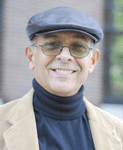Three times last month, Professor Robert Mnookin brought in a special guest via videoconference to speak to his reading group. The topic was negotiating with Cuba, and the speaker was Rafael M. Hernández Rodríguez—a prominent Cuban intellectual who has twice been a visiting scholar at Harvard. According to Mnookin, it’s the first time a Cuban scholar has participated in an American seminar from Cuba itself. It took Mnookin weeks of back and forth with Cuba’s Ministry of Culture to obtain permission for Hernández to appear, giving a glimpse into the continued hold of the Communist bureaucracy in Havana.
Mnookin talked later about what Hernández brought to the class. “It’s been fascinating to get the perspective of a Cuban intellectual who deeply believes in the goals and legitimacy of Castro’s revolution, and can defend in a very articulate way Cuban actions. That’s unusual.”
At the beginning of the class on March 20, before Hernández had joined in, Mnookin challenged his students: “Here we have a really well informed Cuban academic whose perspective is not like ours. What do we want to ask him about this week’s reading? What do we most want to learn from him?”
After Hernández appeared, his image projected onto the wall up above the professor’s end of the table, Ronald Anguas ’12 asked the first question, “To what extent is the current political regime helped by the embargo?”
“Of course the embargo is a rallying point,” Hernández replied. “But it’s a real burden for people. I am old enough to remember life without it, but 70 percent of Cubans have always lived under the embargo.”
William C. Marra ’12 followed up with a question about Cuba’s policy toward dissidents. “Cuba has allowed people who look like they might fight against the regime to emigrate. Is that a conscious decision of exporting your troublemakers?”
“In terms of most who have left, the government sees them as economic migrants, not dissidents,” Hernández said. “For the real dissidents, the Cuban government has offered them the chance to leave, but they can’t be forced to leave.”
After more back and forth, Mnookin ended the class by pulling together several student questions around what kind of access Cuban citizens have to free information—and whether Hernández has been given better access than most. “You are extremely well read, well informed. You’ve had access to all kinds of information. But to what extent are there constraints on most Cuban citizens? Can they read what’s written by Cuban-Americans? Can they read things that are critical of the Castro regime?” In response, Hernández focused on access of a different kind. “Two hundred thousand Cuban Americans visited Cuba last year; there are six flights a day from Miami. We are not living in a bubble, or on another planet. We are very much connected.”
A few days after the class, Ashley Nyquist ‘12 was still mulling over what Hernández did and didn’t say. ”This is unlike anything I’ve experienced in any other class. When you’re talking to someone in a politically constrained place, it’s hard to know what to take away from it. Figuring that out is part of the learning experience.”
